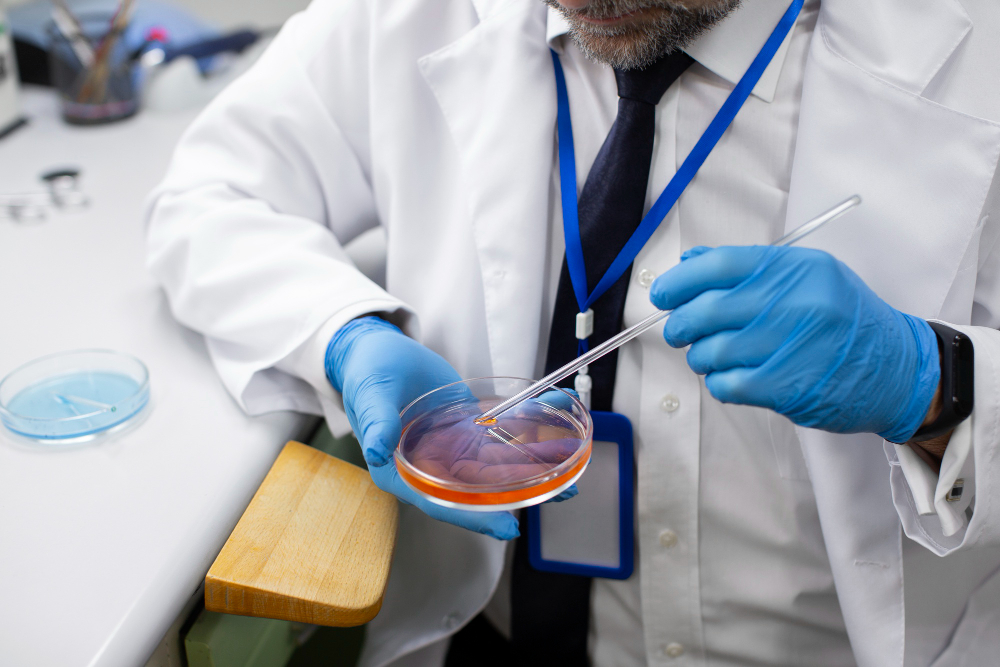Medical Oncology and Haematology
Our Medical Oncology and Haematology department is a recognized leader in the field, consistently pushing the boundaries of cancer care with cutting-edge treatments, innovative therapies, and a commitment to personalized care. At PK Das Cancer Centre, we understand that a cancer diagnosis can be a deeply unsettling experience. It's a time filled with uncertainty, fear, and the need for unwavering support. That's why our Department of Medical Oncology and Haematology is dedicated to providing a beacon of hope, offering the highest level of expertise and compassionate care to those facing the challenges of cancer. Our team of board-certified oncologists and haematologists possess extensive experience treating a wide range of cancers and blood disorders. They are committed to staying at the forefront of advancements in the field. We offer a comprehensive range of services, including:
-
Day care/ IP Chemotherapy
-
Immunotherapy
-
Targeted Therapy
Your Path to Recovery Begins Here
We are dedicated to delivering the highest quality medical oncology and haematology care, offering hope, support, and a commitment to excellence throughout your journey. As mentioned above, we offer convenient day care and inpatient chemotherapy options, ensuring optimal care and comfort for each patient. We are at the forefront of innovative immunotherapy, harnessing the body's own immune system to fight cancer, and we utilize personalized targeted therapies, which precisely target cancer cells while minimizing damage to healthy tissue. This comprehensive approach allows us to provide tailored treatment plans that meet each individual's unique needs and goals. We strongly believe that every individual deserves access to the most advanced and personalized treatment available, and we are dedicated to making that vision a reality.
The cure rate for breast cancer varies by stage, with early detection offering the best prognosis. In Stage 0 and I, the survival rate is nearly 99-100% with timely treatment. In Stage II, the survival rate ranges from 86-95%, depending on tumor size and lymph node involvement. For Stage III, where the cancer has spread locally, the survival rate drops to 66-72%, but aggressive treatment can improve outcomes. In Stage IV, when the cancer has metastasized to distant organs, the survival rate is around 30%, though advancements in treatment are helping extend life expectancy. Early detection, personalized treatment, and continuous medical advancements play a crucial role in improving cure rates.
Immunotherapy is a revolutionary cancer treatment that strengthens the body's immune system to detect and destroy cancer cells. Unlike chemotherapy, which directly attacks cancer, immunotherapy boosts immune responses or removes barriers that prevent immune cells from recognizing tumors. Common types include checkpoint inhibitors, CAR-T cell therapy, monoclonal antibodies, and cancer vaccines. It has shown significant success in treating cancers like melanoma, lung cancer, and leukemia. While effective, it can cause side effects like inflammation or autoimmune reactions. Ongoing research continues to expand its potential, making it a promising advancement in cancer treatment.
Chemotherapy is used in metastatic prostate cancer (Stage IV) when hormone therapy is no longer effective. It works by killing or slowing cancer cell growth, with Docetaxel and Cabazitaxel being the most commonly used drugs. Chemotherapy helps prolong survival, reduce symptoms, and improve quality of life, often in combination with hormone therapy. Side effects may include fatigue, nausea, lowered immunity, and neuropathy, but they can be managed with supportive care. Advances in treatment continue to improve outcomes for patients with advanced prostate cancer.
Metronomic chemotherapy is a low-dose, continuous chemotherapy approach that targets tumor growth while minimizing side effects. Unlike traditional chemotherapy, which uses high doses at intervals, metronomic therapy delivers small doses frequently, preventing tumor regrowth and reducing toxicity. It works by inhibiting blood vessel formation (anti-angiogenesis), boosting immune response, and directly killing cancer cells. This approach is used in various cancers, including breast, ovarian, and prostate cancer, especially in patients who cannot tolerate high-dose chemotherapy. It offers a promising, less toxic alternative for long-term cancer control.
